|
|
|
Sort Order |
|
|
|
Items / Page
|
|
|
|
|
|
|
| Srl | Item |
| 1 |
ID:
182589
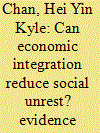

|
|
|
|
|
| Summary/Abstract |
When dealing with autonomous regions, states may utilize Unionist Economic Integration (UEI) programs to forge a stronger sense of unionism. However, the literature has not been able to explain why UEIs work differently across regions. With the identical UEI implemented in Macau and Hong Kong, Macau seems to be firmly within Beijing's grasp, yet protests in Hong Kong are still intensive. Why is economic integration effective in appeasing some regions, but not others in the same polity?
I argue that what makes UEI effective in appeasing a region is the region's economic dependence on the national center. UEIs add to the expected cost of contention, and thus high economic dependence sets that baseline to a higher degree, leading to effective appeasement with UEIs. I illustrate my argument with empirical analyses of two original datasets of protest counts and discontent with authoritarian institutions in Hong Kong, Macau, and Chinese provinces.
|
|
|
|
|
|
|
|
|
|
|
|
|
|
|
|
| 2 |
ID:
182594
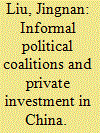

|
|
|
|
|
| Summary/Abstract |
This article attempts to estimate the effects of informal political coalitions on China's private investment. Theoretically, the party-state clients of China's supreme leaders are expected to have stronger incentives to foster economic growth. One way of doing so is to encourage private investment by reducing its political risks. Analysis of provincial-level panel data from 1993 to 2017 shows that personal connections—based on shared experience in the same work unit—between provincial leaders and the Chinese Communist Party's incumbent supreme leader significantly increase the growth rate of private investment. This suggests that informal institutional relations may assist the development of China's private economy by partially compensating for the weaknesses of formal rule-of-law institutions.
|
|
|
|
|
|
|
|
|
|
|
|
|
|
|
|
| 3 |
ID:
182588
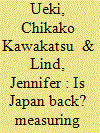

|
|
|
|
|
| Summary/Abstract |
Observers of East Asia frequently claim that Japanese nationalism is on the rise, and that Tokyo is abandoning its longtime military restraint. To determine whether these trends are indeed occurring, we define and measure Japan's nationalism and military assertiveness; we measure whether they are rising relative to Japan in the past, and relative to seven other countries.
|
|
|
|
|
|
|
|
|
|
|
|
|
|
|
|
| 4 |
ID:
182590
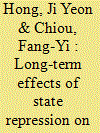

|
|
|
|
|
| Summary/Abstract |
This article examines how violence against citizens affects their political attitudes and behavior in the long run, and how those effects vary over time. We construct and analyze a novel dataset on the victims of Taiwan's February 28 Incident, in 1947, with survey data spanning 1990 to 2017. Our empirical analysis shows that cohorts having directly or indirectly experienced the Incident are less likely to support the Kuomintang Party (KMT), the former authoritarian ruling party responsible for the Incident. They tend to disagree with the key conventional policy stand of the KMT (unification with mainland China), are more likely to self-identify as Taiwanese, and are less likely to vote for KMT presidential candidates. Taiwan's residents who were born in towns with larger number of casualties during the Incident are more likely to reject unification. Finally, the effects are found to vary over the period following democratization.
|
|
|
|
|
|
|
|
|
|
|
|
|
|
|
|
| 5 |
ID:
182592
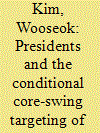

|
|
|
|
|
| Summary/Abstract |
In this article, I present a theory of conditional core-swing targeting that focuses on the competition for majority control in legislative elections to explain how presidents use their strong budgetary powers to manipulate the distribution of the national subsidy in South Korea. Presidents whose parties already possess a legislative majority are expected to favor core municipalities to strengthen the foundations of their majority constituency, whereas those who seek majority control are predicted to prioritize swing municipalities in an effort to cross the majority threshold. Presidents are also anticipated to respond to the electoral cycle by shifting subsidies to riskier municipalities when elections approach. Using a novel data set on national subsidy allocations that spans three decades, I find evidence in favor of the hypotheses. This article demonstrates that the beneficiaries of distributive favoritism are not fixed, and that politicians can engage in complex and varied targeting strategies to achieve their objectives.
|
|
|
|
|
|
|
|
|
|
|
|
|
|
|
|
| 6 |
ID:
182591
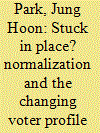

|
|
|
|
|
| Summary/Abstract |
Using the case of the Indonesian Prosperous Justice Party (PKS), I seek to measure the actual impact of Islamist parties’ moderation on their electoral performances and voter bases. Statistical analyses find that although PKS has experienced an influx of diverse voters since the early 2000s, the influx was offset by a gradual withdrawal of educated Islamist voters, who had been loyal to the party since its establishment. I further claim that this change in PKS's voter profile was attributable not to moderation per se but to normalization, manifesting in an adaptation of the party elites’ behaviors to the existing patterns in Indonesian politics. The party's recent policy shift with a conservative tone was insufficient to regain votes from its original supporters, who already saw PKS as a run-of-the-mill party. PKS's case implies that it is necessary for Islamist parties to maintain their distinctiveness as an alternative voice in the party system.
|
|
|
|
|
|
|
|
|
|
|
|
|
|
|
|
| 7 |
ID:
182593


|
|
|
|
|
| Summary/Abstract |
We present a theory on how trust in the central government to remedy grievances combined with a lack of trust in local government to act motivates people to participate in local protests in China. Low trust in local government combined with high trust in the central government gives people expectation that protest will not be an exercise in futility. People protest to redress injustices when they believe that such protests have a chance of producing a favorable resolution of their grievances. Utilizing individual level data from the Asian Barometer Survey Wave 4, our analysis suggests that, in contemporary China, people who have greater trust in the central government than the local government are more likely than others to report having participated in protests. In a society without meaningful elections, participating in protest is an effective strategy for attracting the attention from the upper-level authorities in hope of redressing unfavorable situations.
|
|
|
|
|
|
|
|
|
|
|
|
|
|
|
|
|
|
|
|
|